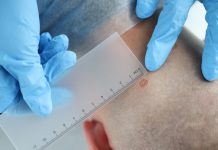
In a new survey from the American Academy of Dermatology (AAD), researchers found that one-third of Americans lack a basic understanding of sun safety and skin cancer.
In the study, the team surveyed 1000 adults and found 53% of respondents didn’t realize shade offers protection from the sun’s ultraviolet (UV) rays, and 47% incorrectly said a base tan would prevent sunburns or were unsure.
About 35% said tanning is safe as long as you don’t burn or were unsure, and 31% were unaware that tanning causes skin cancer.
These findings suggest that misperceptions about skin cancer and sun exposure are still prevalent.
In addition, the survey revealed that people born after 1996 (Generation Z) had the greatest misunderstandings about sun exposure, followed closely by those who were born between 1981 and 1996 (millennials).
Of Gen Z respondents, 42% were unaware that tanning causes skin cancer; 41% didn’t know that UV rays are reflected by snow, water and sand; and 33% didn’t realize they could get sunburned on a cloudy day.
Among millennials, 42% were unaware the sun’s UV rays can penetrate clothing; 37% didn’t know that tanning causes skin cancer; and 23% were unaware that sunburn increases skin cancer risk.
The team says Gen Z and millennials have a lifetime of potential damaging sun exposure ahead of them, so now is the time to close the knowledge gap and ensure they are aware of how easy it is to practice sun-safe behavior.
The academy offered tips for staying safe year-round.
These include seeking shade, especially when the sun’s rays are strongest (between 10 a.m. and 2 p.m.), and wearing sun-protective clothing, including a lightweight, long-sleeved shirt, pants, wide-brimmed hat, and sunglasses with UV protection.
Clothing with an ultraviolet protection factor (UPF) on the label is more effective. It also recommended using a broad-spectrum, water-resistant sunscreen with a sun protection factor (SPF) of 30 or more on all skin not covered by clothing.
Sunscreen should be reapplied every two hours or more often if swimming or sweating.
If you care about skin cancer, please read studies about some skin cancer may start from hair and findings of a new way to detect 95% of skin cancer.
For more information about skin cancer treatment and prevention, please see recent studies about the key to treating common skin cancer and results showing that this common arthritis drug may increase skin cancer risk.
Copyright © 2021 Knowridge Science Report. All rights reserved.



